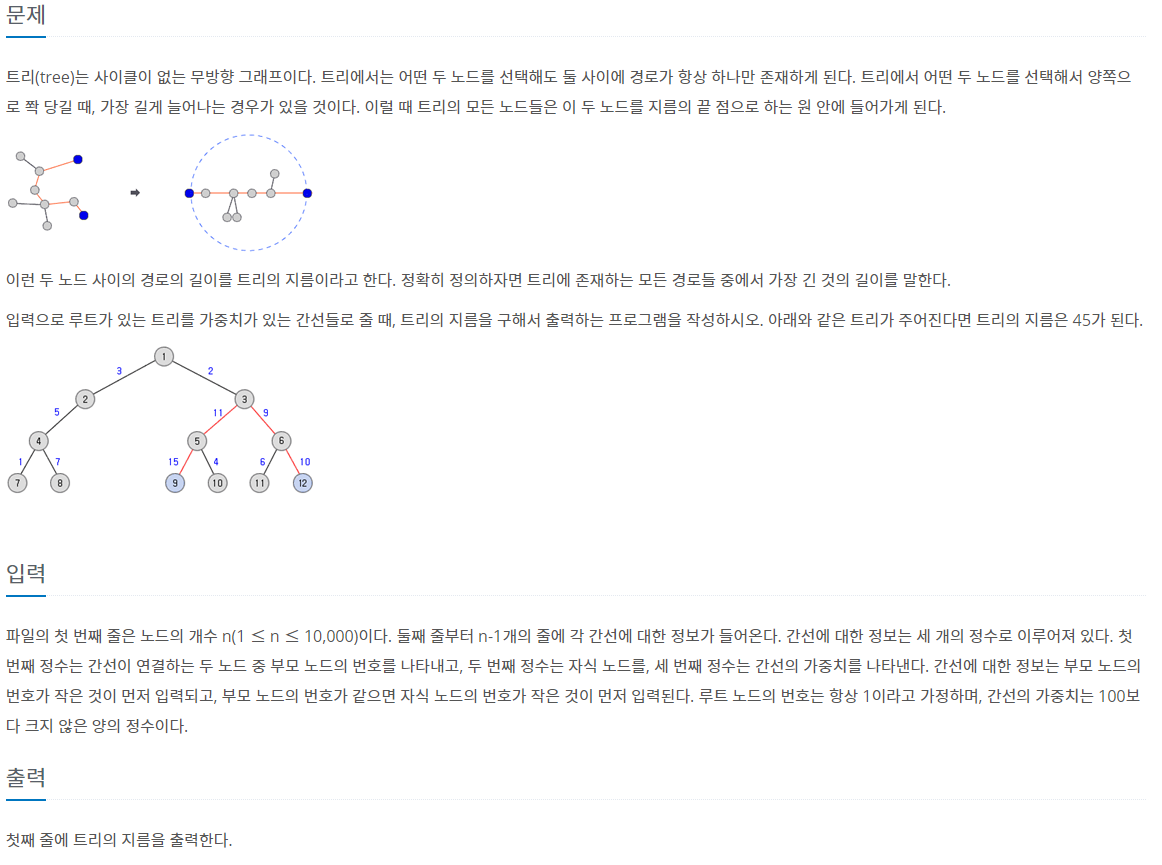solved.ac 백준 골드문제 포스팅
문제

DFS
깊이 우선 탐색, 그래프의 자식을 우선으로 탐색한다.
추후 다른 포스팅에서 BFS와 함께 정리 예정
접근법
지름을 구할 때 가장 서로 멀리 떨어져 있는 두 노드를 구해야 한다.
-> 처음으로는 루트 노드에서 가장 멀리 떨어진 노드를 구한다. (이 때 DFS 또는 BFS를 통한 탐색 수행)
-> 다음으로는 구한 노드에서 가장 멀리 떨어진 노드를 구한다. (탐색 수행)
이렇게 두 번의 DFS로 문제를 해결할 수 있다.
주의
문제에서 보다시피 최대 노드 개수가 만개이다. 메모리를 조금이나마 비효율적으로 사용하게 되면 바로 메모리 제한에 걸리게 된다.
-> 그래프를 행렬로 표현하기보다는 인접 리스트 형태로 표현하는게 옳다.
(그래프를 HashMap으로 구현하여도 메모리 제한을 초과한다.)
코드 - JAVA
import javafx.util.Pair;
import java.io.*;
import java.util.*;
class Main {
static ArrayList<Pair<Integer,Integer>> edges[];
static boolean visit[];
static int max = 0;
static int maxIndex = 0;
public static void main(String args[]) throws IOException {
BufferedReader br = new BufferedReader(new InputStreamReader(System.in));
int N = Integer.parseInt(br.readLine());
edges = new ArrayList[N+1];
for(int i=0; i<edges.length; i++){
edges[i] = new ArrayList<>();
}
for(int i = 0 ; i < N-1 ; i++){
StringTokenizer st = new StringTokenizer(br.readLine());
int parent = Integer.parseInt(st.nextToken());
int child = Integer.parseInt(st.nextToken());
int dist = Integer.parseInt(st.nextToken());
edges[parent].add(new Pair<>(child,dist));
edges[child].add(new Pair<>(parent,dist));
//그래프를 양방향 그래프로, 리스트의 형태로 담음
}
visit = new boolean[N+1];
dfs(1,0);
//Root 노드에서 제일 멀리 떨어진 노드 찾기
int start = maxIndex;
maxIndex = 0;
max = 0;
visit = new boolean[N+1];
dfs(start,0);
//지름을 구하기 위한 노드를 찾기
System.out.print(max);
}
public static void dfs(int start, int weight){
visit[start] = true;
if(!edges[start].isEmpty()){
for(Pair child : edges[start]){
if(!visit[(int) child.getKey()]){
if(max<weight+(int)child.getValue()){
max = weight+(int)child.getValue();
maxIndex = (int)child.getKey();
}
dfs((int)child.getKey(), weight+(int)child.getValue());
}
}
}
}
}